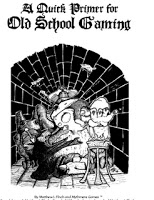 There has been a bit of discussion of late concerning the impact that Wizards of the Coast’s reissue of the old (A)D&D pdfs will have on the OSR. First, JB at B/X Blackrazor asked “Have we won the battle only to lose the war?“
There has been a bit of discussion of late concerning the impact that Wizards of the Coast’s reissue of the old (A)D&D pdfs will have on the OSR. First, JB at B/X Blackrazor asked “Have we won the battle only to lose the war?“
Is the OSR…as a movement to create new, good material in the Old School style (and thus to promote Old School role-playing)…is the OSR dead?
Why shouldn’t I put down the $10 to get original B/X over Labyrinth Lord? Why shouldn’t I take the original Erol Otus artwork over illustrations that are simply supposed to conjure nostalgia in my heart?
Within a day of JB’s post, Dan at Goblinoid Games opined:
WotC has added their material back to the ecosphere where it was in the beginning, and I think that will only strengthen the cause for old-school gaming. People have already been converted to the idea that the older versions of the game are just as valid as the recent ones, and WotC’s recent business decisions only reinforce that.
Erik Tenkar (one of the most prolific OSR bloggers around today) said:
The OSR isn’t going anywhere. Putting the originals back into PDF format isn’t going to gut the OSR of “old school players” anymore than DnD Next is. If anything, making the originals available in PDF format is likely to bring us the newly curious…
Dave at Blood of Procopius asks “Do we still need Labyrinth Lord?” and answers his own question:
I would answer that question with an unequivocal YES for two very important reasons:
LL is an established brand with a license that hobbyists like myself and small publishers can easily and legally publish under with full knowledge that whatever we produce can be used by those who want to do the B/X thing with virtually no conversion at all.
More importantly to me, LL has a library of compatible games that are specifically designed to be modular.
And I’m sure there are others out there whose contributions to the discussion I’ve missed. If I may be permitted to be self-referential, I believe that what I said about the OSR Phase II applies directly to JB’s original point:
But while the first phase of the OSR has seen foundational works such as those mentioned above [straight or near clones of earlier games], what we are now seeing in the OSR is a flowering of material that take off in wild new directions. Now that the final holes in the retro-clone coverage have been filled (the basic game-play of (A)D&D 0E, 1E, and now 2E are covered by multiple products), the OSR as a whole seems self-confident enough to break off in new directions.
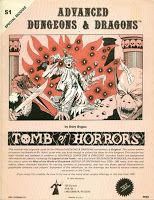 So, to bring this back to JB’s original point, I don’t think that WotC’s re-release of the older games and modules will in any way dampen the creativity or productivity of the self-identified OSR. While acknowledging that the economy is tough and many people don’t have as much disposable income as they might have had at the dawn of the OSR a few years ago, the OSR will take these WotC pdfs and use them to grow like green slime on a first-level magic user. Let me tell you why.
So, to bring this back to JB’s original point, I don’t think that WotC’s re-release of the older games and modules will in any way dampen the creativity or productivity of the self-identified OSR. While acknowledging that the economy is tough and many people don’t have as much disposable income as they might have had at the dawn of the OSR a few years ago, the OSR will take these WotC pdfs and use them to grow like green slime on a first-level magic user. Let me tell you why.
Right now, there are four basic types of products that the OSR is putting out; clones, adventures/settings, supplements, and what I’ll call originals. Let’s see how each one is impacted by the re-releases. I am not going to include the science-fiction, science fantasy, and other genres, but the same principles apply there as well (or will, if and when WotC starts releasing pdfs of Gamma World, Boot Hill, etc.).
First, we have the retro-clones; restatements of the original rules with more or less fidelity to the details. In this category we have products such as OSRIC, Labyrinth Lord, Swords & Wizardry, For Gold & Glory, etc.
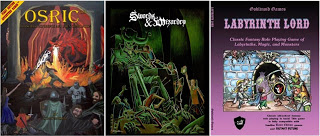 At first glance, the re-release of the WotC pdfs may seem to render this category obsolete, and indeed time will tell what the long-term impact on downloads and sales of these titles will be. The obvious rebuttal is that the retro-clones are better written, more organized, and generally more player-friendly than the originals were (although in the case of 2E and the Rules Compendium, this may be less true). Thus, new players who are introduced to these older games by way of the DnDClassics.com site may seek out the clones for sheer utility, in order to get the same experience with more easily-digestible rules. In any event, this category is pretty well not going to see growth (in terms of new products) because we’ve seen most of the restatements of the original rules already, and more complete restatements simply aren’t needed any more. People chomping at the bit to do them and include their own favorite house rules should look to the third category below and simply publish those house rules on their own.
At first glance, the re-release of the WotC pdfs may seem to render this category obsolete, and indeed time will tell what the long-term impact on downloads and sales of these titles will be. The obvious rebuttal is that the retro-clones are better written, more organized, and generally more player-friendly than the originals were (although in the case of 2E and the Rules Compendium, this may be less true). Thus, new players who are introduced to these older games by way of the DnDClassics.com site may seek out the clones for sheer utility, in order to get the same experience with more easily-digestible rules. In any event, this category is pretty well not going to see growth (in terms of new products) because we’ve seen most of the restatements of the original rules already, and more complete restatements simply aren’t needed any more. People chomping at the bit to do them and include their own favorite house rules should look to the third category below and simply publish those house rules on their own.
Second, we have adventure modules and settings; either specific scenarios or entire campaign worlds. There are hundreds of these currently available, supporting most of the retro-clones above, plus many more that are deliberately “generic” and which are intended to be usable with just about anything with a healthy dose of (A)D&D in its genome.
From the very dawn of the hobby, when the original rules were still in print, third party publishers were putting out adventure modules and settings. I would argue that the availability of the original rules in pdf format actually increases the market for new adventure modules and settings with which to use those rules. The market for adventures is only a limited one for a very small subset of the customer base; few people are going to be agonizing between buying Temple of Elemental Evil and Anomalous Subsurface Environment. While there may well be a short-term drop in third-party adventures while folks flock to DnDClassics.com to fill in the gaps in their collections, over the long term sales and downloads of the new stuff will pick up again as people get everything they’ve been looking to get of the old stuff. Everyone who buys the original Holmes rules is a potential LL and S&W customer.
Third, we have supplements; books that have rules that are designed to be used in addition to, or as a replacement for specific, rules in other games. In this category we have things like new monster books (Monsters of Myth, Malevolent and Benign, Teratic Tome) as well as straight-up rules supplements like Realms of Crawling Chaos, A Curious Volume of Forgotten Lore, the Advanced Edition Companion (admittedly something of a hybrid), the B/X Companion, etc.
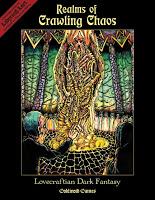 The products in this category actually should boom because of the new availability of the older titles, and indeed JB mentions in his post quoted above that he’s seen an uptick in sales of his B/X Companion since the original B/X Rules were made available. The challenge to the publishers of these products is to get the word out about their existence and compatibility without violating the OGL rule against declaring compatibility. If they can get over that hurdle, they’ll prosper. I also happen to think that this category and the one following will see enormous growth in the coming years, and DnDClassics.com will only fuel that growth.
The products in this category actually should boom because of the new availability of the older titles, and indeed JB mentions in his post quoted above that he’s seen an uptick in sales of his B/X Companion since the original B/X Rules were made available. The challenge to the publishers of these products is to get the word out about their existence and compatibility without violating the OGL rule against declaring compatibility. If they can get over that hurdle, they’ll prosper. I also happen to think that this category and the one following will see enormous growth in the coming years, and DnDClassics.com will only fuel that growth.
Fourth, we have what I’m calling originals, but the term shouldn’t be taken as disparaging in any way to items in other categories. Here we have games that are sufficiently different in terms of mechanics to be considered new games that attempt to recreate an old-school aesthetic. I include here Adventures Dark and Deep, Castles & Crusades, Dragons at Dawn, Adventurer Conqueror King, Dungeon Crawl Classics, Barbarians of Lemuria, etc.
Here, I think we see another medium for enormous growth, which will be incidentally helped by DnDClassics.com, but which is largely unconnected to it. What impact the reprints will have on this sector is in the general sense of validation of the old school aesthetic that the OSR champions. Whether one believes that this aesthetic is real or a bit of revisionist history, the fact is that it exists and is now a recognized force within the gaming hobby/industry. The mere fact that WotC wants to tap into it by making the old pdfs available once more is proof of that. As more people are introduced to the concepts and conceits of the older editions of the game, they’ll be more willing to experiment with games that take those concepts and conceits into new areas with new mechanics, and thus this sector will grow. There is no real direct impact, of course, any more than there is a direct impact between WotC publishing the original Holmes rules and a game like Dogs in the Vineyard. But the indirect impact is certainly there.
So, I think that the republishing of the old classic pdfs will actually be a good thing for the OSR as a whole. There aren’t any more retro-clones to create, and the ones that spurred the OSR in the first place are there for those who discover the original games and want something more player-friendly. Adventures and rules supplements will always be in demand, and work equally well for the classic games or their simulacra. New old-school games will benefit from new players being exposed to the older means and modes of play, with some players going from the Holmes rules into something more mechanically, but not aesthetically, experimental such as Barbarians of Lemuria. And, of course, we can only hope that the republication of the AD&D 1st edition rules will lead to an enormous demand for Adventures Dark and Deep. 😉


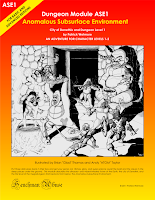
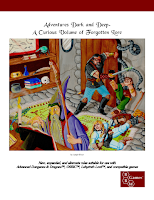
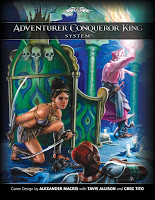







Without OSRIC, authors would be hard pressed to release "AD&D" compatible products and not be at the mercy of WoTC's lawyers.
As much as I love the old products I rather like the "old school" products put out using OSRIC as a rules system so I can play it in my AD&D games. I will still buy the older items (already been getting the 1e rules books) but new AD&D content is great for me.
Another thing which helps the OSR is many of the OSR products are available in print! I love my iPad and PDFs but I want print to learn and (at least initially) play a ruleset. I still find it much easier to flip back and forth through pages of a physical book than a PDF.
There is also the greater sense of ownership with a physical product, emotionally they are huge jump over a collection of 000s and 111s!
Personally, I think "originals" has misleading connotations. I prefer the term neo-retro.
The sky isn't falling!
Phew! 😉
I'll have to revisit my post of a few years ago come to think of it. Most of these I'd call near-clones.
The big unknown is the "stripped down" version of D&D 5th that Mearls has been hinting at.
If it's indeed compatible with all the old school stuff then things are going to bust wide open. You will see an official, current Wizards product hybridizing and competing with the OSR's modules and ideas – the main points of difference being ascending AC, tripartite save, and other such details.
A new Golden Age, perhaps?
We are already in a new golden age.
I don't think the OSR is going anywhere either. It's already well established it's newer material created by players of the game and it has passion as a driving force.
I'm excited that WotC are re-releasing this stuff, but after all they are a large corporation (no I'm not an anti-capitalist) with sales as being the driving force rather than a rabid fanbase. I don't think it will be too long before they disappoint us again.
Then again, I like the idea of any project with my illustrations in it becoming collectable! 🙂